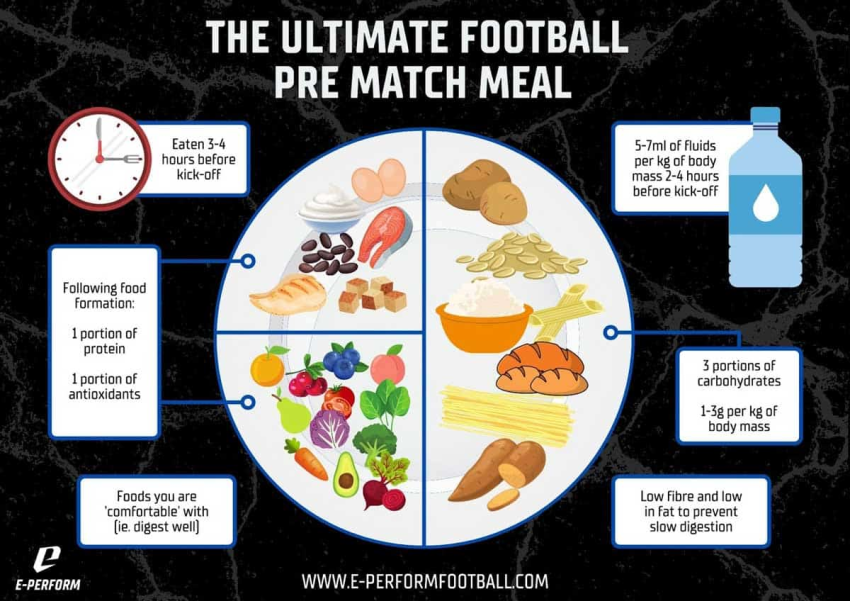Soccer nutrition is a fundamental aspect of athletic performance that can significantly impact how players perform on the field. Proper dietary choices are essential for fueling performance, optimizing energy levels, and enhancing recovery during intense training and matches. In this guide, we will explore nutritional tips for soccer, detailing how a well-balanced soccer diet can boost stamina and concentration. From understanding the importance of healthy foods for soccer players to crafting the perfect meal plan, each element contributes to a player’s success on the pitch. By prioritizing effective nutrition strategies, athletes can unlock their full potential, ensuring they are always game-ready.
When discussing the importance of athletic dietary practices, one might refer to it as sports nutrition for soccer players. This encompasses a variety of components aimed at supporting energy for soccer action and maximizing performance sustainably. The careful selection of ingredients and meal timing plays a crucial role in enhancing physical abilities and aiding recovery, making it a vital topic for athletes. Additionally, an emphasis on wholesome foods and appropriate macronutrient ratios ensures that players remain at their peak during matches. By understanding and implementing effective diet principles, soccer athletes can thrive both on and off the field.
Essential Nutritional Tips for Soccer Players
As a soccer player, understanding the nuances of nutrition can be the difference between a good game and a great game. Nutrition is about more than just eating healthy foods; it’s about timing, quantity, and the types of foods consumed. A balanced diet rich in carbohydrates, proteins, and healthy fats can significantly enhance stamina and recovery. Incorporating foods like whole grains, lean meats, and plenty of fruits and vegetables can ensure that players obtain the necessary vitamins and minerals to support their rigorous training schedules.
Additionally, hydration plays a crucial role in maintaining energy levels and overall health for athletes. It’s important to monitor fluid intake, particularly before, during, and after matches. Electrolytes are equally vital, especially during intense training sessions. Making a habit of drinking water regularly throughout the day can keep dehydration at bay and enhance performance on the field.
Crafting the Perfect Soccer Diet Plan
Creating a well-structured soccer diet plan is essential for players looking to optimize their performance. This plan should center on nutrient-dense foods that provide sustained energy. For example, incorporating foods like brown rice, quinoa, and starchy vegetables can provide the necessary carbohydrates that are vital for fueling those long runs on the field. Additionally, planning meals around practices and matches can ensure that energy levels remain high, preventing fatigue and enhancing concentration.
Moreover, effective nutrient timing is crucial when crafting an effective soccer diet. Consuming carbohydrates 3-4 hours before a game can furnish the body with energy reserves to draw upon. Post-match nutrition should be equally prioritized, with protein-rich foods aiding muscle recovery and growth. A sample meal plan could include a balanced breakfast of oatmeal, protein-packed lunch with lean meat, and a nutritious dinner featuring salmon, all tailored to meet the dietary requirements of a soccer athlete.
Frequently Asked Questions
What are some nutritional tips for soccer players to fuel performance?
To fuel performance effectively, soccer players should focus on a balanced diet rich in carbohydrates, healthy proteins, and fats. Carbohydrates should make up 60-70% of their caloric intake, with options like whole grains, fruits, and vegetables providing sustained energy. Lean proteins, such as chicken, fish, and dairy, are crucial for muscle repair. Incorporating healthy fats from sources like nuts, seeds, and avocados can enhance overall health and hormonal balance. Hydration is also vital; players should drink water regularly and consider electrolyte drinks during intense training. Following nutrient timing—eating carbohydrates pre-match and protein post-match—will optimize energy levels and recovery.
What should a soccer diet include to optimize energy for soccer players?
An optimized soccer diet should include a high percentage of complex carbohydrates, such as brown rice, quinoa, and fruits, to provide the energy necessary for high-intensity activities. Proteins from lean sources like chicken, eggs, and fish are essential for muscle recovery and repair. Healthy fats from sources like olive oil, nuts, and fatty fish help maintain energy levels and hormonal health. Additionally, proper hydration and strategic meal timing (consuming carbs before games and proteins after) are crucial components of a soccer diet to ensure that players maintain peak performance throughout matches and training sessions.
| Key Components | Description | Examples |
|---|---|---|
| Carbohydrates | Primary energy source for soccer players, essential for maintaining endurance and stamina. | Brown rice, quinoa, whole grain bread, fruits (bananas, berries) |
Summary
Soccer nutrition is vital for any athlete looking to maximize their performance on the field. To excel in soccer, players must prioritize a diet rich in carbohydrates, lean proteins, and healthy fats while ensuring proper hydration and nutrient timing. A well-planned meal strategy enhances energy levels during games, aids recovery post-training, and minimizes the risk of injuries. By emphasizing these nutritional essentials, soccer players can better support their physical demands and improve their overall athletic performance. Following structured meal plans can not only bolster energy and recovery but can ultimately lead to improved outcomes during intense matches. Stay dedicated to your nutrition as much as your training, and you will see the results on the pitch.
